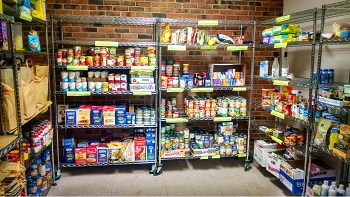By Troy Daly, Staff Writer
This past November, Hannaford Supermarkets made a commitment to donate $1 million to food pantries in Northeast schools, and $300,000 of it will go to food pantries in Maine, according to Maine Public Radio. The majority of that donation ($288,000) is going directly to the Good Shepherd Food Bank (GSFB) which is based in Auburn.
According to a USDA report, on average between 2016 and 2018, 13.6% of Maine households are subject to food insecurity. In 2018, the national rate was 11.1%. The trends in both Maine and the U.S. are declining.
The United States Department of Agriculture (USDA) defines food insecurity separately from hunger. Food insecurity is a household-level economic and social condition of limited or uncertain access to adequate food. Hunger is an individual-level physiological condition that may result from food insecurity.
Good Shepherd Food Bank is a non-profit organization which provides resources to food pantries all across Maine.
Jessica Gildea who manages the youth and family and programs at GSFB explained how the donation is being used, “That’s to support our expansion of food school pantries in head start locations across the state. So in the next two years, we’ll be launching at least 30 school pantries in head start locations all over the state.”
The Food Bank has a specific way of deciding what school programs to support. “We conducted a community needs assessment, so we looked at all of the head start locations across the state and then we evaluated the existing resources in those communities.” Gildea said all of the programs are then ranked in terms of need in order to determine how to prioritize support.
GSFB mainly works with primary education, but is gradually expanding its involvement with higher education. The organization currently works with SMCC, Kennebec Valley college, University of Maine Bangor, and University of Maine Orono. “It’s something we’re really interested in talking to more people about because it’s definitely a need that we’re aware of,” said Gildea.
The University of Southern Maine is also addressing the issue of food insecurity. There is a food pantry located in Woodbury Campus Center on the Portland campus, which is only available to USM students. It is managed by graduate assistant Madeleine Lutts, who works in Student Affairs and at the information desk at Woodbury. She described how USM students struggle with food security.
“We see that students are definitely challenged by having to put themselves through school, pay for tuition, pay for books, pay for housing… There are so many different levels of [food insecurity]. You can be food insecure, but not be hungry. You can be sacrificing nutritional value and still be eating whatever you can find.”
Students, however, aren’t the only people on campus who are struggling. Lutts said that she’s seen faculty and staff members there as well. “It’s surprising how many different people are utilizing the food pantry.”
The campus food pantry weighs their outgoing food in order to track what has been given away. The information is then presented back to the donors. There has been over 500 pounds of food given out this semester.
Monetary donations and food drives help fund the campus food pantry. University Credit Union, Sodexo, and Cumberland County Food Security Council have all been big supporters.
Twice a year, the food pantry has a food drive. Different departments of faculty and staff compete to donate the most individual items. Last year the winning group received a pizza party. “It’s a good way to incentivize staff and faculty to get them to support the pantry,” said Lutts.
Students are also encouraged to get involved, though that has been tough. Madeline Lutts explained that working in the food pantry, volunteering, or being a part of the food drive is a great way to do it.
“The best way to do it is through a class. We’ve had one class [do it] this semester, [in] Tourism and Hospitality. Their whole class came together and got a bunch of donations from hotels… Even if the class isn’t related to food studies or food insecurity, any class can participate and you can bring in food throughout the semester. Get your professor onboard. We would love to see more student groups compete in the food drive.”
Donations are non-perishable food, personal hygiene products and gift cards to Hannaford or Walmart.
The campus food pantry will be closed from December 23 through January 6. However, if students are in need during those two weeks, they are welcome to reach out via email to Madeline Lutts or anyone in Student Affairs. There are also food supplies on the Gorham and Lewiston/Auburn campuses, though there are no pantries. If for some reason they aren’t available, Student Affairs staff will be more than willing to make special accommodations for people in need.

